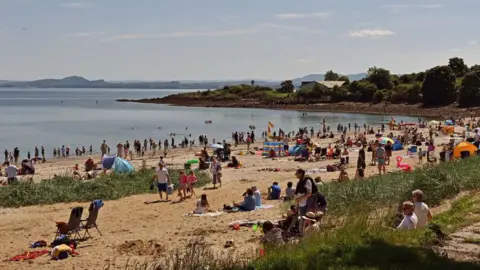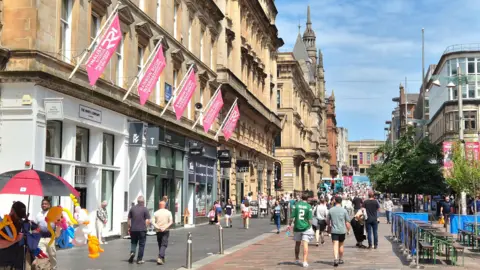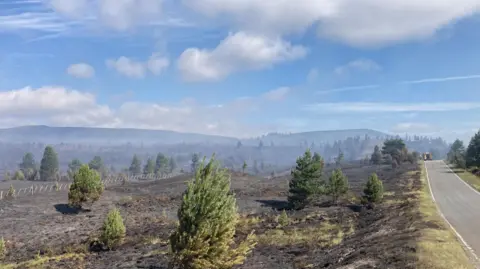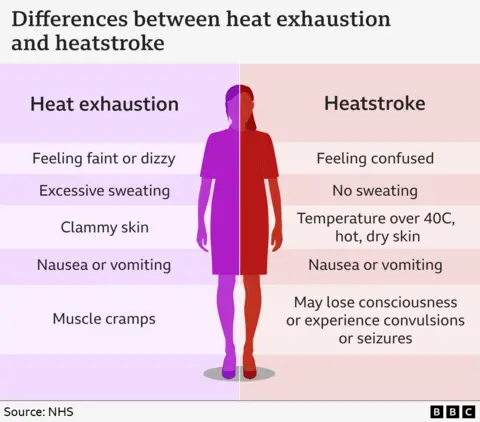Heat health advice as temperatures set to soar
Scotland could see its hottest day of the year this weekend, with temperatures possibly reaching 30C as several large public events are held across the country.
TRNSMT, the country's biggest festival, is due to begin in Glasgow on Friday with three days of acts including headliners Biffy Clyro, 50 Cent and Snow Patrol.
Other big events at the weekend include Tiree Music Festival and the Island Games returning to Orkney for the first time in 20 years.
Advice about staying safe in unusually high temperatures has been issued, and firefighters have issued alerts about possible wildfires.
The Scottish Fire and Rescue Service said there was an "extreme" risk of wildfires for central and eastern Scotland on Friday.
This will then extend across the whole country, apart from low-lying areas with green grass, lasting through until Monday.
Anyone going to events this weekend is advised to stay hydrated, wear sunscreen and stay in the shade as much as possible.
What is the forecast for this weekend?
Blue skies and sunshine are expected across Scotland on Friday with temperatures in the mid-twenties.
Saturday brings even hotter weather with potential highs of 30C and more clear skies for most.
The weather is predicted to be warmest in the west of Scotland with the sunshine stretching into Sunday.
 Getty Images
Getty ImagesThe rest of the UK could see even hotter weather over the weekend as some areas experience their third heatwave of the summer.
Yellow heat health alerts from the UK's Health Security Agency are in force across central and southern parts of England where highs of between 27C and 33C, perhaps even 34C, are expected.
Will there be a heatwave in Scotland?
We could potentially see Scotland's first heatwave of the year this weekend.
According to the criteria, it must reach 25C on at least three consecutive days in the same area to be considered a heatwave.
Last month Glasgow was just shy of a heatwave with two consecutive days soaring past 25C while the third day lingered at 24.4C - just missing the mark.
 BBC Weather Watchers - Graham
BBC Weather Watchers - GrahamDespite the hot and sunny weather this weekend, it's not here for long.
We will start to see temperatures fall on Monday as showers and cooler air moves in from the north-west.
Thunder is forecast for some parts of the country.
And the cooler weather is predicted to spread to all parts of the UK on Tuesday.
Is this spell of hot weather unusual?
It has been unusually warm in Scotland this year throughout spring and early summer.
Spring saw record-breaking sunshine and above-average temperatures, with some areas experiencing their hottest days of the year in May.
So far Scotland's hottest day of this year was when the mercury rose above 28C at Drumnadrochit on the shore of Loch Ness on 20 June.
The average temperature for this point in June in Scotland is around 17C.
While the country experiences warmer temperatures in the summer months, it is unusual to hit 30C.
The UK's hottest day of the year has increased over time and climate scientists are clear that the heat has been boosted by our warming climate.
In May, the combination of heat, sunshine and very low rainfall led to water scarcity across Scotland.
Scottish Water warned customers to use supplies sparingly after the driest start to the year since 1964.
What events are on this weekend?
About 150,000 revellers are expected to head to Glasgow Green for the three-day TRNSMT festival.
Organisers have urged attendees to wear sun cream and stay hydrated.
Festival-goers can refill soft reusable water bottles at water points across the grounds.
 PA Media
PA MediaTiree Music Festival will kick off on the Hebridean island on Friday.
The Scottish folk music festival has run across three days annually since it was founded in 2010 - except when it was cancelled due to bad weather in 2023.
And the Island Games are being hosted in Orkney from Saturday, with thousands of visitors from around the world expected to descend on the Scottish archipelago.
An estimated 2,000 competitors and volunteers at the week-long event will swell Orkney's population by almost 10%, but many spectators are also expected to make the trip.
Some of Scotland's roads are expected to be busier than usual with people travelling to beaches, parks or lochs to cool down and enjoy the warm weather.
What are the warnings?
The fire service has urged anyone heading out into rural areas to act safely and responsibly.
Fire crews tackled a wildfire in the Dava area of the Highlands on Wednesday.
The blaze was brought under control by 22:30 using jets, beaters and knapsacks.
It comes following a series of wildfires across Moray and the Highlands in the last couple of weeks.
 Cawdor Forestry Ltd/Cawdor Estate
Cawdor Forestry Ltd/Cawdor EstateGroup commander Raymond King said: "We are asking the public to exercise extreme caution and think twice before using anything involving a naked flame.
"Many rural and remote communities are hugely impacted by wildfires, which can cause significant damage.
"Livestock, farmland, wildlife, protected woodland, and sites of special scientific interest can all be devastated by these fires - as can the lives of people living and working in rural communities.
"These fires can also have a hugely negative impact on the environment, and the release of greenhouse gas emissions into the atmosphere."
The BBC has also warned that parts of the UK could even see short term interference to television or radio service due to the high pressure.
What health advice is there?
Public health registrar Dr Nick Riches urged people to stay out of direct sunlight between midday and 15:00 and stay hydrated.
He said: "It is important to keep indoor temperatures comfortable, particularly for those who are less able to control their body temperature such as young children, the elderly and those with chronic medical conditions.
"Consider closing curtains during the hottest part of the day and opening windows when it's cooler outside, such as the early morning or late evening.
"Check in on neighbours, friends or relatives who may struggle with the heat, especially those who live alone."
Dr Riches advised those going outside to wear sunscreen and a wide-brim hat.
Anyone using a barbecue is urged to consider food safety advice by ensuring meat is cooked all the way through and different utensils are used for vegetables, raw chicken and other raw meat to reduce the risk of salmonella.
Those on medication are also asked to check if this is impacted by the heat.
What is the difference between heat exhaustion and heatstroke?
During hot weather, it can be easy to overheat, sometimes resulting in heat exhaustion or heatstroke.
Heat exhaustion is not usually serious as long as you can cool yourself down - but heatstroke is a medical emergency which requires immediate treatment.
Heat exhaustion can turn into heatstroke, which means your body can no longer manage the heat and your core temperature is rising too high.

Some groups, including older adults, young children and people with long-term health conditions can be particularly at risk.
The body's ability to regulate temperature is not fully developed in the very young and can be reduced by illness and some medications, while being overweight or obese can also make it harder to cool down.
Heat exhaustion can affect anyone, including fit and healthy people - especially if they have done strenuous exercise in high temperatures or have been drinking alcohol in the sun all day.
